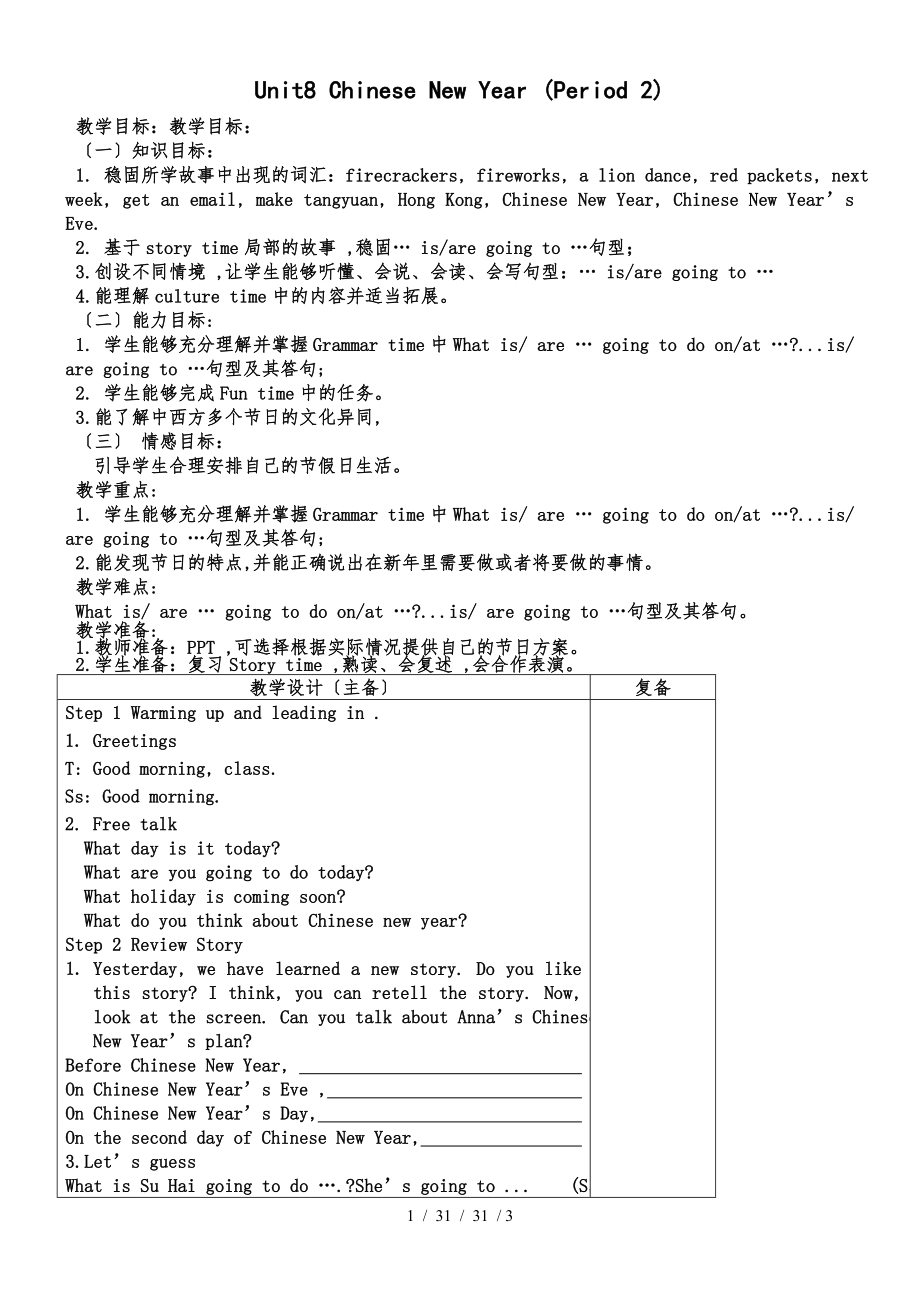《六年級(jí)上冊(cè)英語教案Unit8 Chinese New Year (Period 2)譯林版(三起)》由會(huì)員分享,可在線閱讀�,更多相關(guān)《六年級(jí)上冊(cè)英語教案Unit8 Chinese New Year (Period 2)譯林版(三起)(3頁珍藏版)》請(qǐng)?jiān)谘b配圖網(wǎng)上搜索。
1�、Unit8 Chinese New Year (Period 2)
教學(xué)目標(biāo):教學(xué)目標(biāo):
〔一〕知識(shí)目標(biāo):
1. 穩(wěn)固所學(xué)故事中出現(xiàn)的詞匯:firecrackers, fireworks, a lion dance, red packets, next week, get an email, make tangyuan, Hong Kong, Chinese New Year, Chinese New Year’s Eve.
2. 基于story time局部的故事 ,穩(wěn)固… is/are going to …句型;
3.創(chuàng)設(shè)不同情境 ,讓學(xué)生能夠聽懂��、會(huì)說�����、會(huì)讀、會(huì)寫句型:… is
2���、/are going to …
4.能理解culture time中的內(nèi)容并適當(dāng)拓展�。
〔二〕能力目標(biāo):
1. 學(xué)生能夠充分理解并掌握Grammar time中What is/ are … going to do on/at …?...is/ are going to …句型及其答句;
2. 學(xué)生能夠完成Fun time中的任務(wù)�。
3.能了解中西方多個(gè)節(jié)日的文化異同,
〔三〕 情感目標(biāo):
引導(dǎo)學(xué)生合理安排自己的節(jié)假日生活。
教學(xué)重點(diǎn):
1. 學(xué)生能夠充分理解并掌握Grammar time中What is/ are … going to do on/at …?...is
3�����、/ are going to …句型及其答句;
2.能發(fā)現(xiàn)節(jié)日的特點(diǎn),并能正確說出在新年里需要做或者將要做的事情���。
教學(xué)難點(diǎn):
What is/ are … going to do on/at …?...is/ are going to …句型及其答句�����。
教學(xué)準(zhǔn)備:
1.教師準(zhǔn)備:PPT ,可選擇根據(jù)實(shí)際情況提供自己的節(jié)日方案�����。
2.學(xué)生準(zhǔn)備:復(fù)習(xí)Story time ,熟讀、會(huì)復(fù)述 ,會(huì)合作表演���。
教學(xué)設(shè)計(jì)〔主備〕
復(fù)備
Step 1 Warming up and leading in .
1. Greetings
T: Good morning, class.
S
4����、s: Good morning.
2. Free talk
What day is it today?
What are you going to do today?
What holiday is coming soon?
What do you think about Chinese new year?
Step 2 Review Story
1. Yesterday, we have learned a new story. Do you like this story? I think, you can retell the story. Now, look at th
5、e screen. Can you talk about Anna’s Chinese New Year’s plan?
Before Chinese New Year,
On Chinese New Year’s Eve ,
On Chinese New Year’s Day,
On the second day of Chinese New Year,
6�、
3.Let’s guess
What is Su Hai going to do ….?She’s going to ... (Ss pair work)
Help Su Hai complete the email.
4. Let’s talk
What are you going to do at Chinese New Year? I’m/ We’re going to ...
Step 3 Grammar time
1. Let’s read the sentences and fi
7、nd the pattern of simple future tense. 生試總結(jié)一般將來時(shí)的句式特點(diǎn)��。
分別出示表格
2.結(jié)構(gòu):be going to + 動(dòng)詞原形
3.We use simple future tense to talk about our future.
Step4 Culture time
.I 1.Show many important holidays in the world.
2. Which one is the most important in China / in western?
2. 3.Read cultu
8�、re time
4. How can we development Chinese traditional culture?
Step5 Fun Time
1. T: OK. You all do the good job. We are going to have a rest. Let’s play a game. “pick and say “
T: Now I have four cards here about holidays.
please pick one card and ask some quest
9、ions .
Ss: What are you going to do……?
T: I’m going to ... .
Ss: ...?
T: ... .
2. Ss pick and say in groups.
3. Make a plan for Christmas.
Step6. Homework
板書設(shè)計(jì):
Unit 8 Chinese New Year
What are you going to … at / on ?
I’m going to ……
10��、
Unit8 Chinese New Year〔Period2〕教學(xué)反思
本節(jié)課主要是六年級(jí)上冊(cè)第八單元Grammar time & Fun time & Culture time環(huán)節(jié)的教學(xué)�。Grammar time是通過對(duì)新授詞語句型的歸納 ,幫助學(xué)生理解并初步掌握相關(guān)語法知識(shí)的板塊 ,本單元的語法為一般將來時(shí)be going to結(jié)構(gòu) ,表示打算和意愿做某事 ,難度首先表達(dá)在be動(dòng)詞的選擇上 ,其次表達(dá)在be going to后要加v.原形。因此在教學(xué)過程中要幫助學(xué)生解決這些難點(diǎn)���。在自主提問運(yùn)用的根底上請(qǐng)學(xué)生們自己提煉出句型“be going to + V. 原形〞這一用法表示
11���、打算做某事。同時(shí)引導(dǎo)學(xué)生對(duì)be 動(dòng)詞的選擇進(jìn)行歸納總結(jié)�����。一直以來 ,語法的學(xué)習(xí)都會(huì)顯得枯燥 ,所以 ,激發(fā)學(xué)生的學(xué)習(xí)興趣 ,提高學(xué)生在課堂學(xué)習(xí)中主動(dòng)性就成為第一著力點(diǎn)��。新年活動(dòng)比擬貼近生活 ,學(xué)生求知欲 ,表現(xiàn)欲強(qiáng) ,所以開展小組活動(dòng)或游戲 ,不但能夠激發(fā)學(xué)生的積極性和主動(dòng)性 ,也有利于學(xué)生獲得成就感��。讓他們更加有信心學(xué)到真正的英語 ,并在語言實(shí)踐活動(dòng)中有用武之地。Fun time 主要是通過趣味性�����、互動(dòng)性較強(qiáng)的語言實(shí)踐活動(dòng)幫助學(xué)生掌握所學(xué)內(nèi)容����。本單元以抽活動(dòng)卡片問答的形式展開What are you going to do at Chinese New Year?的討論 ,其開放性不是很大
12、,以句型操練為主 ,用Grammar time新授的知識(shí)進(jìn)行口語交際 ,兩人合作完成What are you going to do? I’m going to … �。 在書本上What are you going to do? 根底上可以拓展到checkout time句型中去,通過游戲更好的穩(wěn)固語法與句型的掌握。Culture time主要是呈現(xiàn):Christmas, Spring Festival, Thanksgiving的相關(guān)知識(shí) ,由于Spring Festival就是中國新年 ,因此此處只要了解等同即可����。Christmas學(xué)生平時(shí)了解的也比擬多 ,稍作呈現(xiàn)即可。Thanksgiving是學(xué)生了解較少的一個(gè)節(jié)日 ,可以利用網(wǎng)絡(luò)資源呈現(xiàn) ,讓學(xué)生對(duì)國外的節(jié)日也有所了解 ,體驗(yàn)中外文化的異同 ,幫助學(xué)生拓展視野��。同時(shí) ,也幫助學(xué)生了解如今社會(huì)中西方文化的一種碰撞與融合����。
由于圣誕節(jié)即將來臨 ,最后一個(gè)環(huán)節(jié)讓學(xué)生結(jié)合所學(xué) ,寫一封關(guān)于圣誕方案的電子郵件 ,由于時(shí)間關(guān)系 ,學(xué)生對(duì)圣誕節(jié)想寫的內(nèi)容比擬多 ,沒有來得及上臺(tái)來展示 ,有點(diǎn)遺憾。
3 / 33 / 33 / 3
 六年級(jí)上冊(cè)英語教案Unit8 Chinese New Year (Period 2)譯林版(三起)
六年級(jí)上冊(cè)英語教案Unit8 Chinese New Year (Period 2)譯林版(三起)

